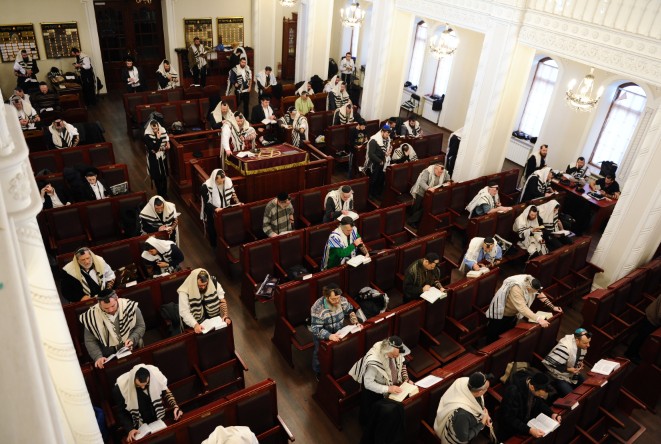Faith
Why Does Judaism Separate Men and Women in Synagogue?
The spiritual, historical, and practical reasons behind gender separation in Jewish prayer and tradition
- Daniel Blass
- |Updated

Ronit asks: "Hello. Why does Judaism demand separation in synagogues? In Western society, there is no separation in workplaces or schools, and it doesn’t seem to harm them. Also, where is this written in the Torah? Thank you."
* * *
Hello Ronit, and thank you for your question.
What preserves a healthy marriage over time is loyalty. It is very hard to maintain loyalty when men and women form emotional bonds in workplaces or social settings outside the home. Human beings are naturally drawn to relationships and the social frameworks limit and guide those relationships. When emotional connections are formed outside of marriage, the family unit is endangered.
When looking at divorce rates in Western society, we find that there exists a social weakness that harms families and needs correcting. Jewish law’s insistence on separation between men and women (as we’ll see in the sources below) protects the intimacy and loyalty between husband and wife. Women, in particular, should value this, because it helps safeguard their husbands’ loyalty.
The Emotional Reality
Let’s be honest:
How many women in modern Western society feel that their husbands don’t give them enough attention, comparing them to women they see at work, in movies, on the street, or at the beach?
How many married women suffer from husbands who are “half-faithful,” emotionally attached to colleagues or friends?
How many feel that as they age, their husbands’ eyes wander toward younger women, treating them as second best, no longer the cherished jewel they once were?
When there is no healthy boundary between the genders, women end up competing for attention, with others who may be younger, more carefree, or simply more available. A wife juggling motherhood, work, and family responsibilities cannot compete with that.
In hard times, the Western man often turns toward emotional bonds outside his marriage, such as connections made accessible in open, mixed social environments. Jewish law’s separation prevents this dynamic from developing in the first place, strengthening family loyalty during both good and difficult times.
 Illustration (Photo: Flash 90)
Illustration (Photo: Flash 90)Separation in Education and Youth
The absence of separation in schools does not create healthy openness — it creates tension, gossip, competition, and pressure to impress. It fosters insecurity, arrogance, and at times even violence. Emotional bonds formed too young often lead to heartbreak, as immature teens mistake attraction for commitment. Repeated heartbreak leaves scars that make it harder to trust and love fully later in life. How many broken hearts, ruined families, and needless suffering stem from immodesty and lack of boundaries?
Ancient Jewish Practice
From the giving of the Torah until today, Jews have practiced separation of men and women in public spaces and in houses of worship. In the holiest site of all, the Temple in Jerusalem, there was a designated women’s section. Even the most righteous men and women were separated there.
The Talmud (Sukkah 51b) records that during the Simchat Beit HaShoeva celebration, separation was instituted after earlier arrangements led to inappropriate levity. If even during mourning — when desire has no power, the Torah required separation, then how much more so during joy, when temptation is stronger.
The Torah itself commands: “Do not follow after your heart and your eyes, after which you stray” (Numbers 15:39). It also warns: “Do not come close to uncover nakedness” (Leviticus 18:6), teaching us to build safeguards that prevent temptation. And: “Your camp shall be holy, that He see no unseemly thing among you and turn away from you” (Deuteronomy 23:15) — linking modesty with success and divine protection.
The Shulchan Aruch, accepted by all Jewish communities, codifies strict guidelines against flirtation, touch, or even gazing at someone who is not one’s spouse. This isn’t about restriction for its own sake, but protecting the sacred trust of marriage and family life.
 Illustration (Photo: Hadas Parush / Flash 90)
Illustration (Photo: Hadas Parush / Flash 90)In Synagogue and Beyond
Men and women pray and study separately. Women attend synagogue and pray in the Ezrat Nashim (women’s gallery), while men form the prayer quorum (minyan). The purpose is to prevent distraction or inappropriate thoughts in a sacred space. Prayer is a time for focusing on God, not on social interaction or attraction.
Even in the Torah we find examples if this when after the Exodus, Miriam led the women in song and dance separately from the men (Exodus 15:20). Even in moments of national joy and holiness, separation was observed.
Modern Challenges
Often, questions about mixed seating arise due to the influence of Reform Judaism. Historically, Reform is not an ancient tradition but a modern movement, arising only in the last 200 years. It sought to reshape Judaism to match Western norms, often disregarding Torah law. Reform communities therefore lack binding commandments, and surveys show high levels of assimilation. Their advocacy for mixed seating is cultural — not rooted in the Torah’s 3,300-year-old tradition.
Judaism requires separation not out of inequality but out of wisdom: to preserve loyalty in marriage, protect families, and safeguard sacred spaces. It is a boundary born from deep understanding of human nature, tested and upheld throughout Jewish history.

